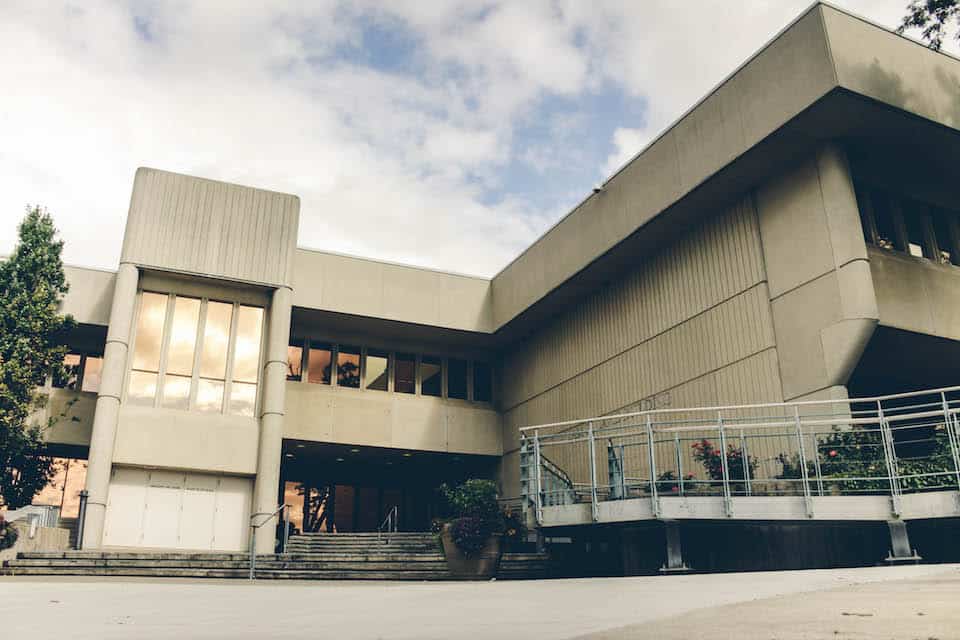Five Mississauga mayoral candidates contended at a debate organized by the University of Toronto Mississauga Students’ Union (UTMSU) on October 4 at the UTM Innovation Complex atrium. The candidates debated on a wide range of topics, from opinions on Premier Doug Ford’s government to how Mississauga could be more equitable.
Of the eight total candidates, incumbent mayor Bonnie Crombie, Yasmin Pouragheli, Scott Chapman, Syed Qumber Rizvi, and Andrew Lee attended.
Mohsin Khan and Tiger Meng Wu were not present, and controversial candidate Kevin Johnston was not invited, according to the UTMSU. Johnston was charged with promoting hate in an earlier incident in March.
The debate began with opening statements and included a question period.
Opening statements
Crombie spoke about her work in office, highlighting the success of initiatives such as ‘Making Room for the Middle,’ which aims to keep housing affordable for middle-class families and create a safer city.
Rizvi, a second-time candidate in the Mississauga elections, held a similar sentiment to Crombie’s, proposing affordable housing projects for single-parent households and low-income families.
Chapman, another second-time candidate, spoke of an initiative to compensate residents for using solar panels in an effort to encourage sustainability and environmental consciousness.
Pouragheli, a 26-year-old law school graduate, presented her plan for legislative reform and said that she intends to help municipalities raise revenue.
Lee, a retired engineer, has a platform that advocates for seniors and students alike, drawing from his experiences as a senior citizen in Mississauga.
Question period
The panel consisted of questions from the UTMSU on transit, student housing, immigration, and child care, as well as questions submitted from the audience on community engagement and diversity initiatives.
One Mississauga resident was concerned about transparency between the city council and residents, asking candidates about initiatives the city could undertake to facilitate communication and address unheard complaints.
“Call 3-1-1,” suggested Crombie, referring to the city’s hotline connecting residents to city services and information.
Chapman proposed a direct line to the mayor’s office, encouraging transparency and open communication between residents and the council.
Candidates were also asked questions regarding recent issues such as the changes to the Ontario sexual education curriculum and the increase in minimum wage.
Most of the candidates present looked unfavourably on the provincial government’s decision to revert to an older version of the curriculum.
Chapman said that he was “disappointed” in Ford’s decision as it would impact the quality of education in Mississauga schools.
“I feel that our students should be taught in the schools, not by people their own age and misinformed.”
Pouragheli expressed her support for the 2015 curriculum implemented by the previous provincial government, commenting that “there needs to be a dialogue regarding sensitive topics,” as children are being exposed to sensitive information at a much younger age from the prevalence of social media and the internet.
Crombie also expressed her support for the 2015 curriculum, especially as it taught students about topics such as cyberbullying, gender identity, and consent. She noted that parental consultation is needed to put forward an updated curriculum and allow transparency between school boards and parents.
Lee shared Crombie’s view, calling for a proper curriculum that involves both school board officials and parents.
“Sex education should have two parts,” he said. “One: knowledge education, and two: behaviour education.”
Candidates also expressed strong support for the minimum wage increase.
Chapman said that he is a strong believer in the minimum wage increase as it provides a larger disposable income for families in need.
Echoing that, Crombie said that “people have to have a minimum income to succeed.”
When asked about a possible $15 minimum wage, Pouragheli said, “I think we should keep it as it is and see what happens to the economy in a few years.”
On top of minimum wage, she suggested adding additional services for families in need.
While Lee supported the minimum wage increase, he also acknowledged that wages should be set according to standards of living and need to be balanced.
Toward the end of the debate, an audience member asked about diversity and equity initiatives in employment and what candidates would do to encourage inclusion.
Crombie suggested removing names on résumés, a practice used by employers to prevent bias and focus on merit. She added that jobs serving the community, such as police services and firefighting, should reflect the diverse community that they serve and suggested advertising jobs in cultural newspapers.
Pouragheli agreed with Crombie on removing names on applications, although she said that there could still be small indicators and leeway for bias. Chapman noted that, on top of removing names in job applications, gender also should be removed to address further bias.
Recalling his experience seeking employment in 1973, Lee agreed with merit-based applications and called for greater equity initiatives. Rizvi said that the mayor of Mississauga would look past bias and take opinions, regardless of race.
Advance voting for UTM students happened from October 13–14 at all community centres and elementary and secondary schools in the Ward 8 area.
On October 22, UTM students will have access to various voting locations near campus. St. Mark Separate School, South Common Community Centre, Holy Name of Mary College School, Erindale Secondary School, Oakridge Public School, St. Margaret of Scotland Elementary School, and St. Clare Separate School in Mississauga all offer polling booths close to their classrooms.


